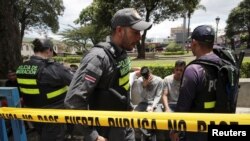Costa Rican President Carlos Alvarado has rejected demonstrations and violence aimed at an influx of Nicaraguans, who have fled to Costa Rica to escape the political crisis in their country.
In a speech Sunday, Alvarado said the majority of Nicaraguans seeking refuge in Costa Rica are "good people who are looking for job opportunities and different forms to contribute with the society." He said anyone who represents a risk to national security or breaks Costa Rican law would be promptly deported.
Protests in Costa Rica flared Saturday at La Merced Park in the capital, San Jose, where some Nicaraguan immigrants have been camping out.
To some Costa Ricans, it was a matter of taking back their park.
"I can't go to Nicaragua and stay in a park and say: 'this is my park.' We deserve respect," said Henry Tres Rios in Spanish.
Some of the demonstrations turned violent. Costa Rica's minister of public security later said that authorities arrested 38 Costa Ricans and six Nicaraguans, many of them with criminal records.
WATCH: Nicaraguans protest
Costa Rica's government confirms that at least 23,000 Nicaraguans have applied for asylum since June, although some of these people had lived in Costa Rica for several years, making them ineligible to be considered refugees.
Many arrive in Costa Rica with nothing.
"Some of them arrive without clothes and money. They don't have family or friends where they can sleep at night or economic resources to help them," says Nohemí Pavón in Spanish. She is with the Coalition of Nicaraguans in Exile.
Organizations like SOSNicaragua have taken on the task of easing the burden of their fellow citizens who arrive in Costa Rica by raising money with special events.
"This is an event of solidarity with the people of Nicaragua. Different groups of Costa Rican artists are performing in support of Nicaraguans who are asking for asylum," Pavón described one.
SOSNicaragua also provides food to Nicaraguans who are in need.
"Please help us, we are living in violence because of President Daniel Ortega and his wife Rosario Murillo," said Nicaraguan Coni Morales in Spanish.
But not everyone is convinced. A group that opposes the arrival of more Nicaraguan migrants has scheduled another protest this week.
Nicaraguans began demonstrating against Ortega in April after his government moved to cut back social security. When authorities cracked down, protests to demand Ortega's ouster spread.
Less than a week ago, Nicaragua's National Assembly approved a drastic cut to the national budget because of the economic impact of months of anti-government unrest.
More than 300 people have died and thousands of Nicaraguans have fled.
